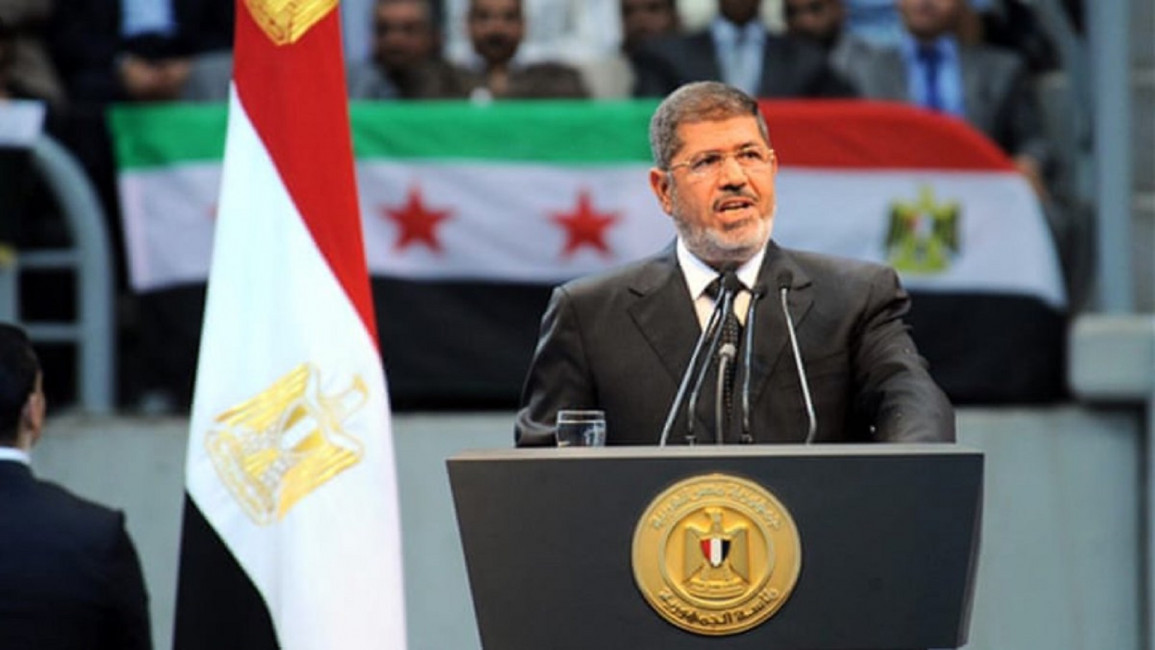Syrians mourn the death of Morsi, remembering his support
Following the death of Egypt's first democratically elected president, Mohamed Morsi, in a courtroom on Monday, Syrians mourned and commemorated him on social media.
As president of Egypt, Morsi welcomed refugees from the Syrian conflict and expressed support for the country's revolution, gaining the enmity of the regime of President Bashar al-Assad.
Syrian refugees were allowed into the country without a visa and given access to Egypt's education and healthcare systems.
On 15 June 2013, Morsi appeared at an event saying he had cut off all Egypt's ties with the Assad regime and expressed support for a no-fly zone over Syria to protect civilians from regime airstrikes.
"The Egyptian people supports the struggle of the Syrian people, materially and morally, and Egypt, its nation, leadership... and army, will not abandon the Syrian people until it achieves its rights and dignity," he said.
Controversially, a spokesman for Morsi also said at the time that his government was at ease with Egyptians going to Syria to fight with Free Syrian Army (FSA) rebels.
This led to the Egyptian army issuing a statement - interpreted as a rebuke to Morsi - saying that its only role was to guard the country's borders.
Two weeks later the coup against Morsi happened with one analyst, Yasser al-Shimy, saying at the time that the president and his spokesman's statements on Syria were a catalyst for the coup.
As soon as the July 2013 coup happened in Egypt, the situation for Syrian refugees, whose numbers had grown to 100,000 changed 180 degrees.
A campaign of incitement began in the media, with Syrians accused of supporting Morsi and manning the anti-coup protests which called for his reinstatement.
Egyptian TV presenter Tawfiq Okasha called for the destruction of Syrians' homes.
Hundreds of Syrians were deported and Syrians were prevented from entering the country. Syrians who remained in Egypt were also denied access to basic services.
On Monday, absentee funeral prayers were held immediately after the announcement of Morsi's death in the opposition-held Syrian city of Al-Atareb, with Syrian journalist Omar Madaniyah tweeting that "this man holds a great place in the hearts of free Syrians".
|
|
| A tweet from Omar Madaniyah showing Syrians praying for Morsi and saying that "he holds a great place in the hearts of free Syrians" |
Photographer Anas Al-Shamy said on Facebook, "Morsi raised the flag of our revolution, supported it, and chanted 'We hear your call, Syria!' when everyone abandoned Syria".
Dara Abdallah, a writer who stressed his ideological differences with Morsi wrote, "The death of Morsi is affecting. It's affecting because you don’t want your political and cultural opponent to die in a prison belonging to a coup-manufacturing criminal with low intelligence like Sisi."
The Syrian National Coalition (SNC), which represents political opposition groups, also offered its condolences on Morsi’s death.
Syrian writer Hasan Al-Daghim Abu Bakr wrote, "I would like the free people of Syria to consider President Morsi as an icon and symbol of the Syrian revolution. His support for the Syrian revolution was one of the causes of his imprisonment and death at the hands of a thuggish coup gang."
Morsi's death in court has been widely blamed on the current Egyptian government, which kept him in solitary confinement and denied him access to adequate medical treatment while he was suffering from diabetes and kidney disease.



